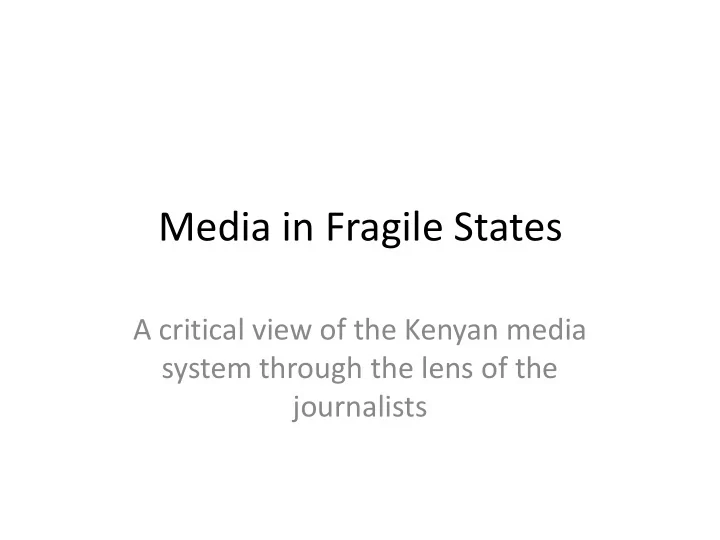

Media in Fragile States A critical view of the Kenyan media system through the lens of the journalists
Literary review • Independence of journalists, regulation of the media and its political economy • Liberalized media - susceptible to both political influence, business interests and market pressure • Political economy: political party influence on media content combined with media owners and advertisers (Nyamnjoh 2004) • Jürgen Habermas ’ notion of a public sphere and the need for dialogical space (Habermas 1985) • Media’s role in curbing corruption in the public sector in Africa (Rønning 2009) -however lacking analysis of corruption in the media itself
A field study in Nairobi 2009 • Extensive interviews aiming to find out how the practice of journalism is related to the structure of the media system • Critique of the normative ideal: high quality professional journalism
A thematic analysis of the interviews • The media is compromised by the owners, the advertisers and the politicians • Common norms and standards are not upheld by any institution, worsened by poor employment conditions and threats to journalists • A wide gap between the reporting that journalists think they should do and what they are expected to do by their employers
Brown envelope journalism • Who and what to expose when can be influenced through bribes and other indirect means • Privately owned media, instead of championing democracy, part of the problem - Corruption in transitional democracy often stems from the competing interests groups in the intermediate class vying for influence over government and economy. Institutions lacking legitimacy, leads to contestation over the rules and a scope for corrupt practices (Kahn 1998) • The institutions that regulate media in Kenya: The Media Council of Kenya, Kenya Union of Journalists, the judiciary
Ethnicity • Referring to ethnic groups in mass media is unavoidable, or not • Pamoja FM, a station in the poorest part of Nairobi, has banned the mention of ethnic groups • Ethnicity is a very useful campaign tool for the politicians, appealing to a group • Media relaying what politicians said in campaign speeches
Regulation • Civil society requires a vigorous political and constitutional defense (Keane 1996 p.149) • Position of journalists exposed to several threats in a transitional democracy • Media’s responsibility to the citizens • Media toes the line of government, which in turn helps their business interests • Media market is small in financial terms and ownership is highly concentrated
Conclusion • Media being used as instruments for political actors in various ways • Lifting censorship and holding democratic elections - recipe for conflict? • Need to transform the media institutions and its relation to business and government • The open and inclusive mass media everyone wants is elusive. In Kenya it has a detrimental effect around each election, where misinformation, tendentious reporting and rumor spreading heightens underlying tensions.
Questions • Neither State driven media or commercial independent media has been able to facilitate the inclusive and open debate on politics. Public Service BC? • Among Kenyan journalists there is the feeling that it is easy to get away with corrupt practices in many parts of society including the media industry. Enforcement? • Examples of good practice and appropriate media regulation - is there a case for more donor funded community media?
Recommend
More recommend